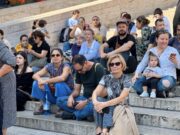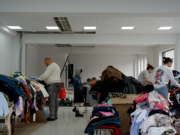Ստորև ներկայացնում ենք փոխանակման ծրագրով ԵՊՀ ժամանած Ալիչյե Բուոնագուիդի անգլալեզու հոդվածը, որը նա պատրաստել է Ժուռնալիստիկայի ֆակուլտետում դասավանդվող “Human Rights and Journalism” առարկայի շրջանակներում։ Հոդվածը պատմում է, թե Բուոնագուիդիի հայրենիք Իտալիայում համավարակի պայմաններում ինչպես են աջակցություն ցուցաբերել ընտանեկան բռնության ենթարկվող անձանց։
For a lot of Italian women who are victims of domestic violence, the lockdown has been just as insidious as the coronavirus itself. Locked up with their violent boyfriends or husbands, many of them have been looking for a way out. But how many of them have reached out to the anti-violence centers?
“The number of calls we received has dropped drastically, especially during the first month” says Dr. Alessandra Montanini of the anti-violence center Per Non Subire Violenza – da Udi. However, the Parliamentary Committee into Violence against Women has made clear that this trend does not indicate that there has been a decline in violence against women, but it rather signals that “victims are even more subjected to the control of the partner who mistreats them”.
Dr. Montanini and the rest of the staff of the center know it all too well, which is the reason why they have shared, on its Facebook page, a video in six different languages. “We wanted these women to know that, although our center had been closed since the 12 March, they could still get in contact with us”. Dr. Montanini and the other workers of the center kept their phones with them at all times. “Most of the women that called us, did so while pretending to take a shower. We could hear the sound of running water in the background. They were frustrated about the situation and didn’t see a way out”.
However, due to the lockdown measures the center could not take any more women in their shelter. “After the first month, a lot more women have started to contact us again, and many of them were in very difficult situations”.
Thankfully, the Liguria region has come to help: “at first, the region has helped us finding a hotel where we could host these women, as they needed to go through quarantine. After some time, however, there has been a big breakthrough: we have been provided with a house that we could use as a new shelter”. This new shelter has immediately served its purpose, as it now hosts a mother with her children who have escaped from an abusive situation. Moreover, the region has provided them with the face masks and the hand sanitizer that they, and the women they host, needed.
From March until the end of May, the center has held 602 telephonic meetings, offering both psychologic and legal counseling. It now serves 146 women, 82 of which sought help for the first time. However, supporting these women during the lockdown has not been an easy task. “To help these women, it is very important to establish a relationship with them. They need to trust you. However, it is very hard to build trust over the phone. You cannot look at them in the eyes. We usually wait for them to call us when they are ready to do so. But this time it was different. Oftentimes we have been reaching out to them to try to keep the communication going” says Montanini.
During the lockdown, the center has been forced to halt all the meetings and the activities they provide to women in need. Nonetheless, the meetings have been moved online and, although the concerns of the workers, the response has been very positive and almost all women have continued to participate in them.
With the end of the lockdown, Per Non Subire Violenza has finally reopened its doors on the 10th of June. The women who wish to meet with the workers of the center can do so booking an appointment. Psychological and legal counseling will still be provided online, as well as the group activities and meetings.
Alice Buonaguidi


























